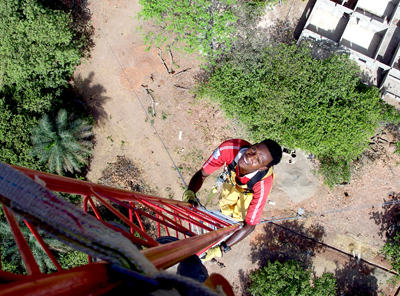 |
| Climbing the 224-foot tower for Rádio Evangélica FM, the new Christian radio station in Gabu, Guinea-Bissau. |
(Jan. 22, 2014 - by Jean Muehlfelt) Nearly 18 years had elapsed since Bissunsate Na Sil, better known as "Bynas," a local believer in the small West African country of Guinea-Bissau, captured the original vision to launch the country's first full-time Christian radio station. Another evangelical station had been on the air only briefly years earlier.
As the years mounted, so did the long list of delays-lack of funds and equipment, difficulty receiving a broadcasting license, technical problems and at least three coups since 1999, the most recent of which erupted in mid-2012. Then the staff had to wait several months before receiving final government approval to go on the air.
The delays caused Bynas and engineers at the HCJB Global Technology Center in Elkhart, Ind., to wonder what God had in store for the station's future, but they persevered. Today the station is in place in Gabu, a city in the eastern part of the country with about 200,000 people. The station officially started broadcasting on Tuesday, Jan. 14.
Helping bring Bynas' dream to fruition was John Hiskey, the founder and president of Servants to Missions, a ministry with a heart to bring the gospel message to Guinea-Bissau. With a calling to reach the African people, Hiskey and his wife, Rachel, began traveling to the country in the early 1990s on short-term trips. In 2002 they became full-time missionaries and moved to Gabu.
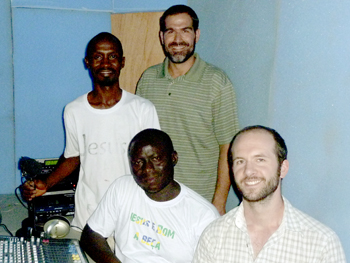 |
Hiskey saw Christian radio as a key strategy to spread the Gospel message in Guinea-Bissau, a country steeped in traditional religions and Islam. More than a third of the 1.7 million people in Guinea-Bissau, a country about the size of Maryland, are animists or are engaged in spiritism. According to Operation World, 52 percent of residents are Muslim; 35 percent follow traditional African religions and just 11 percent are Christian (1.6 percent evangelical).
With a literacy rate of just 40 percent, radio was an ideal medium to reach the local population for Christ, especially as nearly every citizen has access to a transistor radio.
Few citizens complete sixth grade, and public schools are frequently closed due to the government's inability to pay the teachers. The country's official language is Portuguese but is only spoken by about 14 percent of the population-mostly the educated elite. The main trade language, spoken by about half the population, is Portuguese Creole.
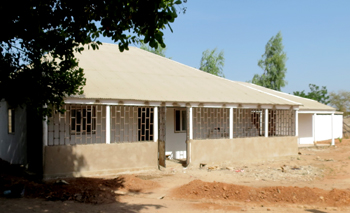 |
| New studio building in Gabu. |
Seeking help and advice on starting a radio station, Hiskey contacted Reach Beyond's Sub-Saharan Africa Regional Office in Accra, Ghana, several years ago. Engineer Jeremy Maller conducted the initial site survey. Then a group of brothers who own a company in Minnesota donated funds to Reach Beyond to pay for the studio equipment.
"We have encountered delays all along the way," related Hiskey. "But it wasn't until after the coup last year that we realized what God was doing. Had there not been delays, our radio station would have been destroyed during the coup along with all the other stations in the country."
Last March, Ed Muehlfelt from the HCJB Global Technology Center in Elkhart, Ind., traveled to Gabu to install a 224-foot radio tower, antenna and coaxial cable. "We ran into many problems along the way," he said. "But I've found in previous station installations that the more powerful the gospel will be in an area, the more problems we face during construction."
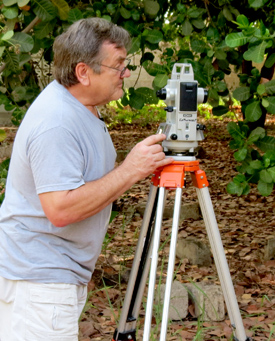 |
| Ed Muehlfelt does survey work at the station site. |
A month later Maller and Alex, a British engineer serving at the office in Accra, traveled to Gabu where they joined with Muehlfelt to install studio equipment, test the transmitter and antenna, and help train the radio staff.
Although the first test broadcast was brief, it was heard by Fernando Gomes, a guard at the campus where the new station is located. Despite being a Muslim, 73 year-old Gomes was excited that Rádio Evangélica FM was finally a reality. "I am very happy with your work here," he said in an interview. "Keep doing what you are doing. We cannot repay you … but God will."
Four national churches will be responsible for the operation of the new station, and Bynas will be the station manager. "The broadcasts will cover about two-thirds of the nation," explained Hiskey in a recent email. "The signal reaches the borders to the north, east and south and about two-thirds of the way across the nation to the west. It's a real blessing."
Even before the coup in 2012, the country was still recovering from a period of civil conflict and political unrest that took place in the late 1990s and early 2000s.
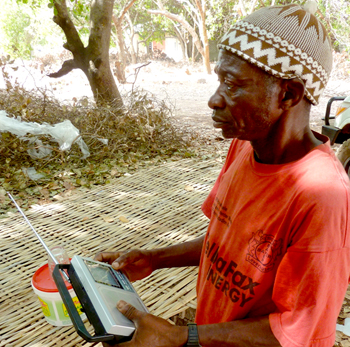 |
| Fernando listens to the station's first test broadcast. |
The new station will complement the Hiskeys' ministry of serving local pastors and missionaries while working to help raise the country's standard of living. Nearly two-thirds of the people in Guinea-Bissau live below the poverty line, and life expectancy at birth is estimated at just 49 years. About 88 percent of residents live on less than one dollar per day.
Before moving to Guinea-Bissau, Rachel served as a social worker and counselor in several places, including an American Indian reservation. This cross-cultural training gave her valuable experience as she now offers home skills classes with local women in Africa, leading to numerous opportunities to share the good news of salvation.
Source: Reach Beyond
